
Evaluation
The Evaluation Collaborative is a network of third-party evaluators who share and learn from one another about meaningful ways to gather, analyze, and report data, including measuring and disseminating performance and impact study results. The TCI Featured Evaluator Blog Series features interviews with members of TCI’s Evaluation Collaborative.
Overview
TCI home page with goals, history, current topics, and events.
Products & Resources
Publications and supplemental resources related to TCI.
Guiding Principles
Principles supporting scaling of transformative change.
Innovative Strategies
Series of briefs featuring strategies.
Evaluation Collaborative
A group for third-party evaluators to share and learn from one another.
Meetings
Approaches to Evaluation that Foster Transformative Change
November 11, 2015
The TCI Evaluation Collaborative hosted an interactive meeting for evaluators to share and learn about evaluation associated with transformative change in the community college. This session featured two nationally recognized leaders in evaluation, Dr. Natasha Jankowski, National Institute for Learning Outcomes Assessment (NILOA), University of Illinois at Urbana-Champaign and Leanne Kallemeyn, Associate Professor in Research Methodologies, School of Education at Loyola University Chicago.
Evaluating TAACCCT: Facilitating a Conversation with the TCI Evaluation Collaborative
February 16, 2015
The Transformative Change Initiative hosted a pre-meeting for evaluators attending Learning Lab 2015. During the meeting the group discussed the implementation and outcome measures being used in TAACCCT evaluations now, and additional measures that may be meaningful to evaluate for TAACCCT and related reforms in the community college context.
American Evaluation Association Pre-Meeting
October 15, 2014
The Transformative Change Initiative hosted a pre-meeting for evaluators attending AEA at the Community College of Denver’s Confluence Building. The agenda included a conversation with Hallie Preskill on evaluation of collective impact, a conversation with Donna Mertens on transformative research, as well as time for a group conversation about evaluation theories and perspectives related to TAACCCT evaluations.
- Presentation slides: Evaluating Transformative Change in Community Colleges
Evaluating Employer Engagement in Community College TAACCCT Grants
September 16-17, 2014
TCI and Skills for America’s Future at the Aspen Institute hosted this event in Washington, DC. Focusing on an assessment of employer engagement under TAACCCT, this meeting explored the nature, extent, and challenges of employer engagement evaluation activities. Special Guests: Mark Mitsui, Deputy Assistant Secretary, US Department of Education and Erika Liliedahl, Senior Evaluation Specialist, US Department of Labor.
Evaluation Collaborative Chicago Meeting
December 9-10, 2013
The agenda for the Evaluation Collaborative meeting included time for sharing TAACCCT evaluation questions and methods, strategies to support data utilization and continuous improvement, efforts to overcome barriers and challenges, and opportunities to collaborate.
- Presentation slides by Debra Bragg and Mindy Feldbaum
Keynote Presentation
Video: 10 considerations for measuring the spread and endurance of educational innovations
By Jeanne Century | 14 minutes
View the full, 50-minute presentation by Jeanne Century.
Events
On November 10, 2015, the TCI Evaluation Collaborative presented research papers that reflect results from sixteen third-party evaluation of TAACCCT projects at this information packed research symposium. The presentations were on a) transformative change and impact evaluation, b) workforce and employer partnerships, c) the national evaluation, and d) student learning.
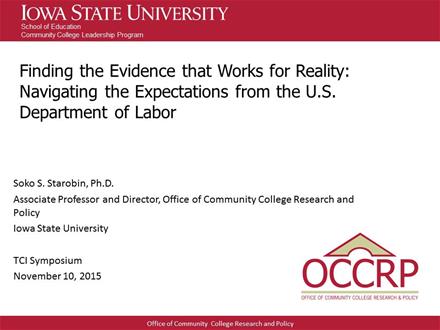
Finding the Evidence that Works for Reality: Navigating the Expectations from DOL
Soko Starobin, Iowa State University
This paper will present a critical discourse around the notion of “scale-up” or “scaling”, which has been the focal point of federally funded programs in educational settings.
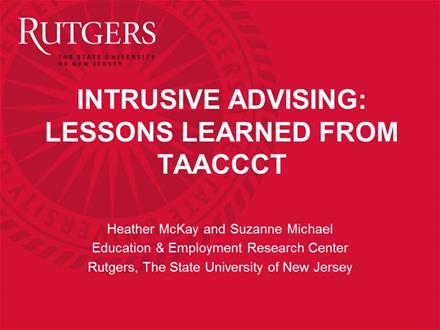
Intrusive Advising; Lessons Learned from TAACCCT
Heather McKay & Suzanne Michael, Education and Employment Research Center, Rutgers
Many TAACCCT grants throughout the country employed advising/coaching strategies to help improve retention, completion and employment outcomes.
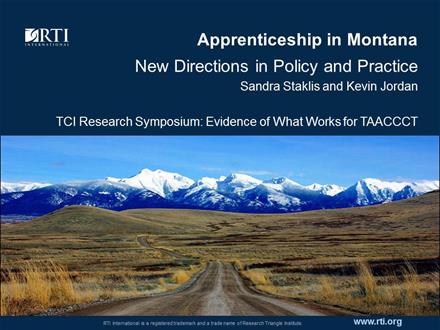
Apprenticeships as a Strategy for Higher Education Completion and Workforce Development in Montana
Sandra Staklis, Kevin Jordan, and Christina Restad, RTI International
This paper is from phase I of a qualitative study of Montana’s TAACCCT-supported efforts to transform and expand the role of apprenticeships in the state.
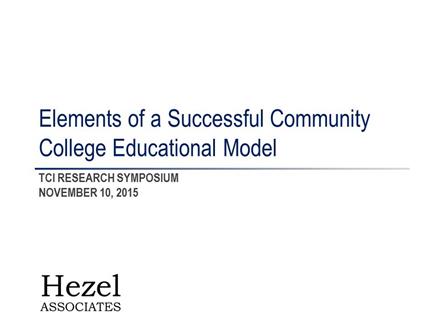
Elements of a Successful Community College Educational Model
Sarah Stewart, Hezel Associates, & Tashera Bolds, Syracuse University STEM Fellow
The National STEM Consortium (NSC) is a ten-college Round 1 TAACCCT partnership focused on developing and delivering one-year certificates in composites, cyber technology, electric vehicle technology, environmental technology, and mechatronics.
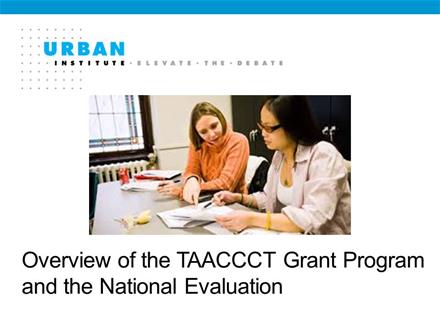
Overview of the TAACCCT Grants Program and the National Evaluation
Lauren Eyster, The Urban Institute
The paper is based on a series of briefs that provide an initial picture of the TAACCCT grants based on analysis of the grant applications for Rounds 1-3.
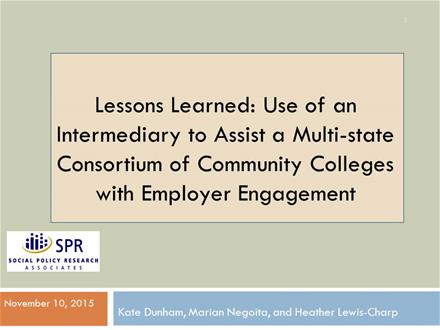
Lessons Learned: Use of an Intermediary to Assist a Multi-State Consortium of Community Colleges with Employer Engagement
Kate Dunham, Marian Negoita, and Heather Lewis-Charp, Social Policy Research Associates
This paper provides a description of how a partnership between an employer-led workforce intermediary and community colleges can help to leverage employer engagement at a regional level, strengthening the ability of colleges to take TAACCCT-funded reforms to scale.
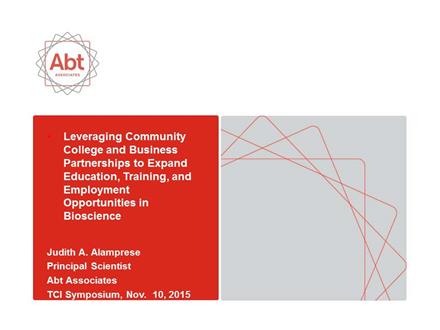
Leveraging Community College and Business Partnerships to Expand Training and Employment Opportunities in the Biosciences
Judith A. Alamprese, Abt Associates
The Community College Consortium for Bioscience Credentials (c3bc) has focused on employer and business engagement as a key strategy for building the colleges’ capacity to meet emerging needs for biosciences training and in harmonizing bioscience standards.
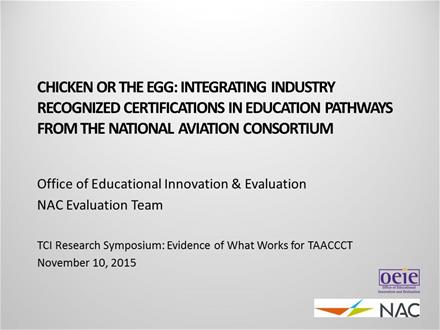
Chicken or the Egg: Integrating Industry Recognized Certifications in Education Pathways from the National Aviation Consortium
Cindy Shuman, Kansas State University
A key component of the National Aviation Consortium (NAC) has been a focus on employer engagement and building relationships between consortium schools and industry partners in aviation manufacturing.
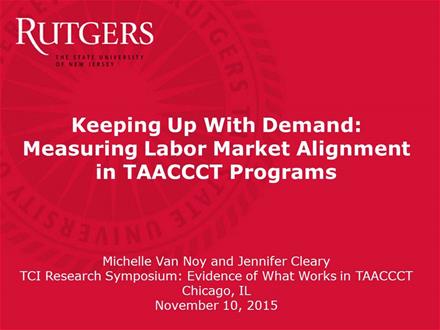
Keeping Up with Demand: Measuring Labor Market Alignment in TAACCCT Programs
Michelle Van Noy, Education and Employment Research Center, Rutgers & Jennifer Cleary, John J. Heldrich Center for Workforce Development, Rutgers
Increasingly, policy makers and the public are focusing on ways that higher education can align with the labor market to better meet student needs and promote workforce success.
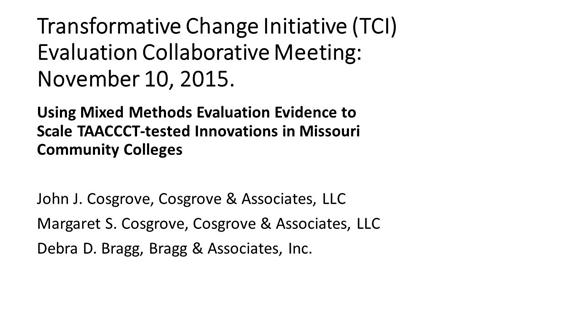
Using Mixed Methods Evaluation Evidence to Scale TAACCCT-tested Innovations in Missouri Community Colleges
John Cosgrove & Maggie Cosgrove, Cosgrove & Associates; Debra Bragg, Bragg & Associates
This paper presents results of the mixed methods third-party evaluation of the round one Department of Labor TAACCCT consortium MoHealthWINs (MHW), the first of three TAACCCT consortia funded by DOL for Missouri.
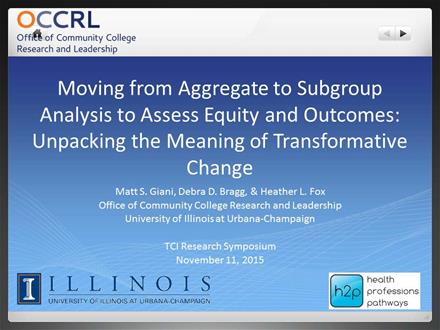
Moving From Aggregate to Subgroup Analysis to Assess Equity and Outcomes: Unpacking The Meaning of Transformative Change
Matt Giani & Debra D. Bragg, OCCRL, University of Illinois
The Department of Labor requires that TAACCCT evaluations produce rigorous and usable evidence of the impact of the reforms on student outcomes.
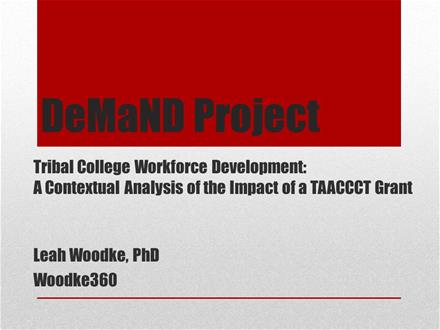
Tribal College Workforce Development: A Contextual Analysis of the Impact of a TAACCCT Grant
Leah Woodke, Woodke360
The project was designed to help the colleges build capacity in terms of equipment, space, relationships, and processes to better and more effectively support workforce development and training.